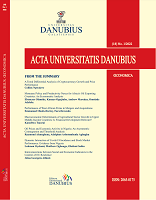Fiscal Deficit and Exchange Rate Movement: Empirical Evidence from Nigeria
Fiscal Deficit and Exchange Rate Movement: Empirical Evidence from Nigeria
Author(s): Ahmed Olwatobi AdekunleSubject(s): Economic history, Economic policy, Post-War period (1950 - 1989), Transformation Period (1990 - 2010), Present Times (2010 - today), Financial Markets
Published by: Editura Universitară Danubius
Keywords: Fiscal Deficit; Exchange Rate; Macroeconomic Policies;
Summary/Abstract: For the case of using fiscal deficit by policy makers, economists have conflicting views and have incessantly debate on how it affects exchange rate movement. This study empirically investigates the attendant connection for the Nigerian case from 1985-2018. At first, we review related literature sequel to which we utilized appropriate econometric techniques. The study uses the bounds testing Autoregressive Distribution Lag (ARDL) method to evaluate the long run and short run relationships amid fiscal deficits and exchange rate depreciation. Amongst others, one finding was that for the Nigerian economy, fiscal deficit depicts indirect impact on exchange rate depreciation - an indication that government fiscal deficit is not a major cause of exchange rate movements for the periods studied. In effects, we recommend that in other to attain both internal and external balance in pursuance of core value of fiscal policy, fiscal management without political interests should be conducted and other macroeconomic policies should be properly implemented as they may have been the cause of sporadic exchange rate depreciation
Journal: Acta Universitatis Danubius. Œconomica
- Issue Year: 19/2023
- Issue No: 2
- Page Range: 7-20
- Page Count: 14
- Language: English

